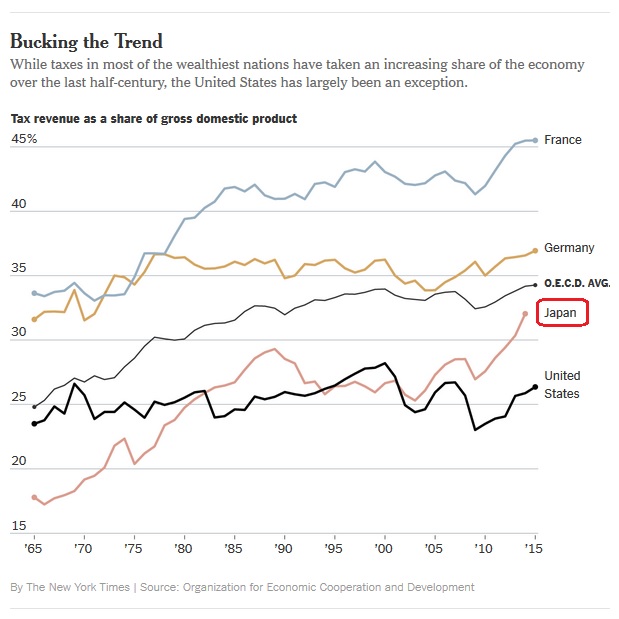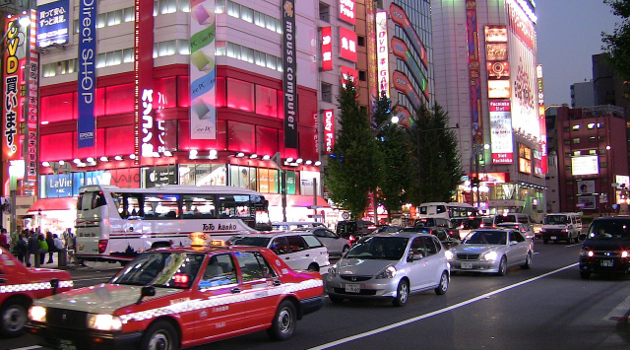Japan is an interesting country to examine if you want insights about public policy.
 We can study the impact of population aging on fiscal outcomes.
We can study the impact of population aging on fiscal outcomes.- We can learn about the utter failure of Keynesian economics.
- We can understand why it’s a very bad idea to impose a value-added tax.
- We can find out that a higher tax burden is bad news.
- We can determine that higher spending is bad news.
Overall, I have a pessimistic view of Japan, but not because it has terrible policy by world standards (it’s currently ranked #20 for economic liberty).
Instead, my concern is that it is drifting in the wrong direction (it was ranked in the top 10 for economic freedom in the mid-1950s) and the country is dealing with grim demographics.
But not everyone shares my view. Indeed, some people even think Japan is a role model. Here are some excerpts from a column in the Japan Times by Jesper Koll of Wisdomtree Investments.
U.S. President-elect Joe Biden can learn a lot from Japan. …the overall result generated by the Japanese economic system
is extremely positive. Japan is the global best-in-class for balancing both income growth and income distribution. …an economy must both grow and distribute the spoils of wealth creation in a fair and equitable way.
So why does Mr. Koll think Japan does a good job?
Mostly because of economic outcomes for lower-income people.
At the end of last year, the median net financial wealth — all financial assets minus liabilities — for households in Japan stood at $104,000. In the United States, it was $62,000. …Japan does have an underbelly of poor people, but compared to America, relatively few are truly left behind financially. …America has more than two times more very wealthy people than Japan, but it also has more than five times more poor people. …In the past eight years, the bottom 10% of income earners saw a $15,000 rise in earnings in Japan, from $17,000 to $32,0000. In contrast, their American counterparts got only $10,000 more income, from $18,000 to $28,000.
For what it’s worth, I’m a bit skeptical of whether the experiences of ethnically homogeneous Japan are directly applicable to an ethnically heterogeneous society such as the United States.
I also think it’s strange that Koll compares the last eight years, which mixes the stagnation of the Obama years with the somewhat better performance of the Trump years.
But it’s interesting that he concludes by observing that you help low-income people with tight labor markets rather than the kind of class-warfare tax policy that Biden has been advocating.
How did Japan successfully bring up the poor? Not by taxing the rich, but by…positive demographic dynamics…because the growing scarcity of labor is forcing steadfast improvement in the type of employment contracts offered, i.e., not just part-time, but full-time as well as solid pay increases at the bottom end of the employment attractiveness spectrum.
But what about Koll’s point about lower-income people being better off in Japan than in the United States?
On that issue, I’m very skeptical.
His article doesn’t include links to data sources, so I can’t comment on the accuracy of his numbers.
But here’s a chart that I first shared earlier this year, which I’ve augmented in red to highlight how the bottom 10 percent of people in the United States are at the same level of middle-income people in Japan.
Call me crazy, but the above data don’t suggest that the United States should copy Japan.
Or what about this chart, which I originally shared back in 2019. It shows that the bottom 20 percent of people in the United States are doing better than the average person in Japan (highlighted in red).
Once again, these numbers don’t lead me to think that America should be copying Japan.
I won’t bother with another chart, but I also invite readers to peruse the OECD’s AIC data, which shows the average person in the United States being way ahead of the average person in Japan.
The bottom line is that I’m all in favor of Joe Biden using other nations as role models. But I would go with Singapore before Japan. Or perhaps he could adopt an a la carte approach, picking the best of the best from around the world (Switzerland’s fiscal rule, Monaco’s tax system, Chile’s private pension regime, etc).
P.S. Japan only ranks in the middle third when looking at the societal capital of nations.
P.P.S. I used to assume that Japan had a competent government sector, stories like this and this have changed my perspective.
———
Image credit: victorpalmer | Pixabay License.



